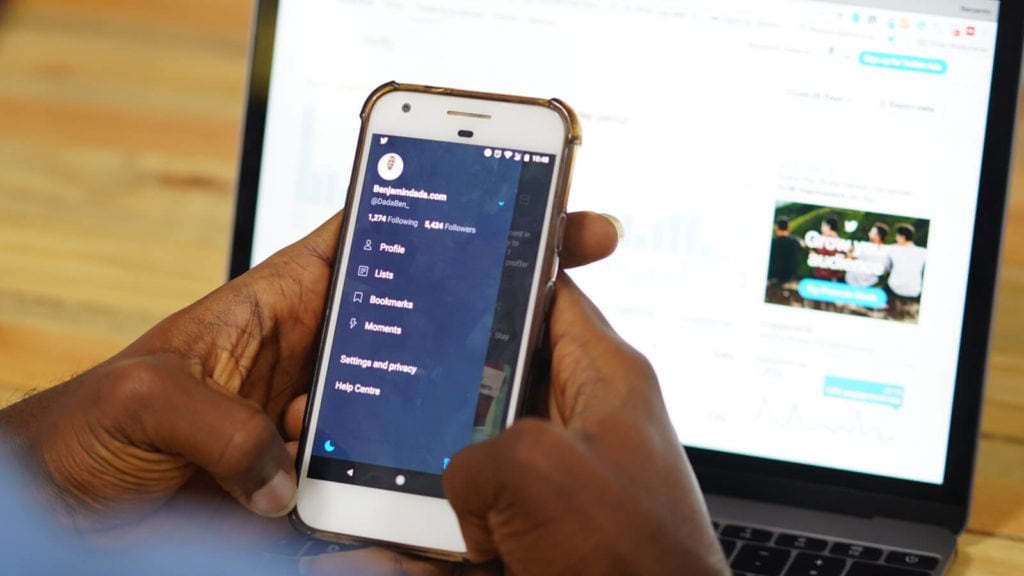Social media can be one of the most fun marketing mediums to work on. Whether your client sells carpet cleaning services or bubblegum, there’s plenty of opportunity to build brand awareness and engagement on the platforms to show your clients your agency rocks.
Of course, you can’t blindly launch a social media strategy and just ask your clients to trust you on it (or maybe you can, but let us know how that plays out). But generally, you need to get all the right information before you take action.
Creating a social media questionnaire for new clients is a good move to help you collect all the information you need about your client upfront rather than wasting time going back and forth with them.
In this post, we’ll cover everything you need to know about how to create a social media questionnaire, what questions to include in a social media survey, and what tools you can use to send your clients your questions.
Don’t have a social media questionnaire? Use our template
Get the information you need much faster with Content Snare. Our ready-made questionnaire templates will get you started right away.
What is a social media questionnaire?

Pretty straight forward, but a social media questionnaire is a series of questions you ask your clients (or soon-to-be-clients) to understand their business and goals before you start working on their social media strategy.
You can take the answers to these questions to develop your creative brief and make data-driven decisions. In a client social media questionnaire, you might ask them questions about:
- Your client’s brand
- Their goals
- Target audience
- Social media channels
- Current social media activity and tools they’re using
- Expectations from a social media strategy
But first, let’s talk about why creating a client social media questionnaire is so important for a marketing agency.
What are some questions to ask in a social media questionnaire?

Here’s a list of 10 of our favourite questions to ask clients in a social media survey and why we like to ask them.
Note:
Screenshots you’ll see below are from Content Snare’s social media questionnaire template.
1. What tone are you looking to use across social media?
Some clients might use a more formal tone of voice on other mediums but might want to keep it casual on social media. It’s not a bad idea to clarify what brand personality they’re looking to bring onto their social profiles.
2. What are your ultimate goals for sales and marketing?
Your client might want to make direct sales, build brand awareness, or get some more engagement with their brand online. Understanding what your client is looking to achieve will help you set your strategy.
3. Where are the majority of your customers based geographically?
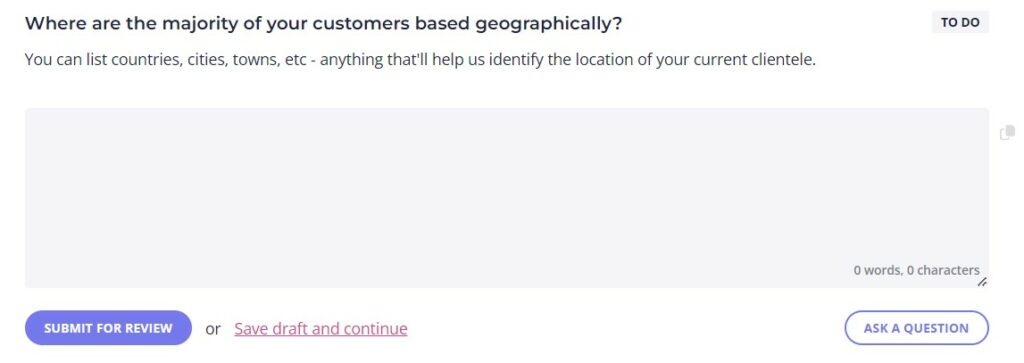
Once you know where your clients’ audience lives, you can start using location-specific hashtags, or set up geo-targeted ads to make sure you’re hitting the right people.
4. How does your online presence compare to that of your competitors?
A competitor might have much more followers, a brighter look to their page, or more engaging content than what your client currently has. Benchmarking against a company that’s doing it well can help you move in the right direction.
5. What type(s) of content are you looking to create for your audience (videos, images, testimonials, blog posts, etc)?
This question will help you start to assemble the right team to get involved in the project. If you know your client wants to make a bunch of video content and you don’t have a dedicated team member with the skills to do the job, it might be time to bring on a freelancer.
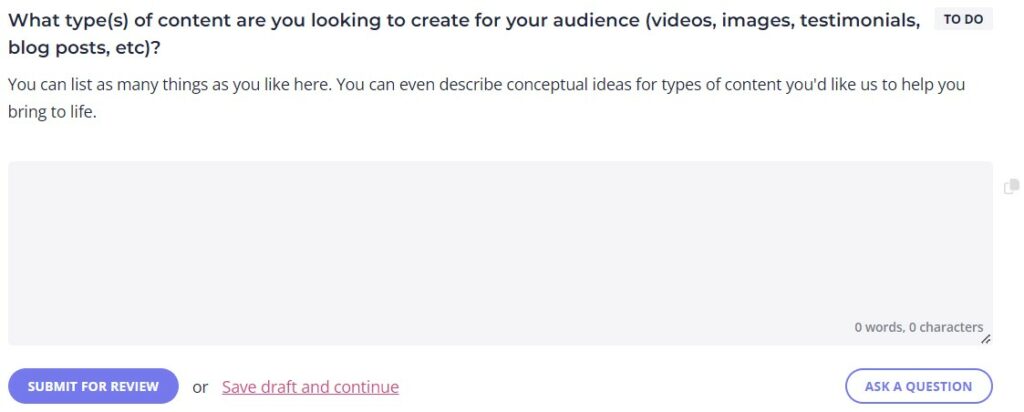
You would also know what types of social media tools (such as IG tools) you should use in order to produce the kind of content they need.
6. Describe your current process for creating a piece of content, from inception to completion.
This will give you some good insight into how your client goes about coming up with an idea and then putting it out. If it seems like they don’t have a solid process nailed down yet, this is where you can come in to help.
7. What do you expect from us as your social media manager?
Super important question.
Some clients might be all about the numbers game, and others might be more interested in communication being the best that it can. Some will want to hand everything to you and let you run with it, while others will still want to be quite involved. Put these expectations out in the open early to make sure you’re on the same page.
8. Who should be our main point of contact at the business? Provide their details
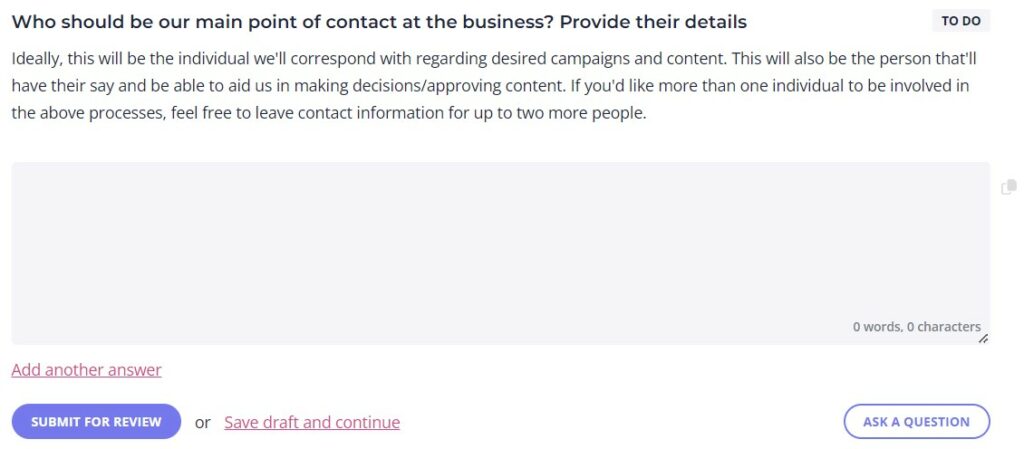
This is a straightforward one, but good to know who you should be harassing about the project, and who you shouldn’t be.
9. How much involvement/control are you looking to have?
As mentioned above, it’s good to know just how much liberty your client is willing to give you.
10. What social media analytics and reports do you want to see? How often?
A client might want you to report on a monthly, quarterly, or weekly basis. Find out what they’re looking to see so you can be prepared to deliver those reports on time.
Content Snare: The easiest way to create a social media questionnaire

Now you know the questions to ask in order to obtain relevant and accurate data from your client, but how exactly do you build a social media survey?
Enter Content Snare.
With dozens of ready-made templates, including a social media questionnaire, Content Snare makes it easy to collect information and documents from your prospective clients. That way, you can focus on understanding your client instead of wasting time on building a template from scratch.

Convenience is the name of the game when it comes to Content Snare. We’ll show you how by explaining its two major benefits:
1. Clients can fill out their questionnaire in their own time
When your client receives their social media questionnaire through Content Snare, they can answer as much of it as they want to, and come back to it later.
With an auto-save feature built into the forms, all information is saved and your clients can complete the form over multiple sessions, picking up where they left off last.
2. You don’t need to use email separately
Content Snare will send your clients email reminders through the platform to remind them to complete the form until they’ve sent it all in. You can set up the frequency of email reminders within the platform and let it do the work for you.
In addition, a number of other built-in features help you collect forms and files from your clients:
- Approvals and rejections directly within your social media surveys
- Pre-filling
- A user-friendly dashboard with a company-wide view
- Effortless data exports
- Bank-level security features
Get your social media questionnaire template now
Get the information you need much faster with Content Snare, so you can start and finish projects sooner. Our ready-made questionnaire templates will get you going right away.
Why should you create a social media questionnaire?

Understanding a new social media client requires effort from your side, but it pays off big time through a whole bunch of valuable insights. Here why:
1. It saves time
Developing a social media questionnaire might take some time at first, but do it once and you’ll end up saving yourself lots of time setting up calls, interviews, and sending out emails to your clients to get the information you need.
Creating a client social media questionnaire is basically an improvement to your agency processes. You’ll thank yourself for doing it later.
2. So you don’t totally miss the mark
Putting together a social media questionnaire is basically one way to do your due diligence on understanding your client’s business before you get started on a project. Just like you would use a brief to make sure everyone’s on the same page, a questionnaire can do the same.
When you do your research, ask the right questions, and get up-to-date answers directly from your client, you’re a lot less likely to completely miss the mark when you deliver your project.
For instance, you’ll learn which social media platforms you should focus on and understand your client’s target audience.
3. To leave a good impression
Here at Content Snare, we geek out on making agency processes as efficient as humanly possible, and the process of gathering information is a big one.
Not only will having social media surveys ready help you save time day-to-day, but when you have good systems and processes in place, it reflects really well on your agency. You always win when you make your clients (or prospects) lives easier too.
4. To communicate your value
When you ask your clients some thought-provoking questions about their business, goals, and audience, it gives you a chance to demonstrate your marketing expertise.
As clients answer your social media survey questions, they already begin to understand the value you’re bringing to the table. Ultimately, having a questionnaire helps you sell your agency’s services indirectly and more easily.
5. To filter out bad clients
If you send your questionnaire out to a potential client and they don’t bother to open it, leave lazy two-word answers, or take their sweet a** time to get back to you, then you’ll already get the idea that they might end up being a difficult client.
Yes, it’s one of those you’ll always have to chase around to get work done. Use your social media survey to identify red flags that a prospect might not be a great fit as a client.
Okay, now the fun part.
Alternative tools to create social media surveys for your client
While we strongly believe Content Snare is the best platform to design social media questionnaires (ask ByteNoize if you don’t believe us), you should know there are many other online form tools to create your social media survey. Here are a few options:
Google Forms
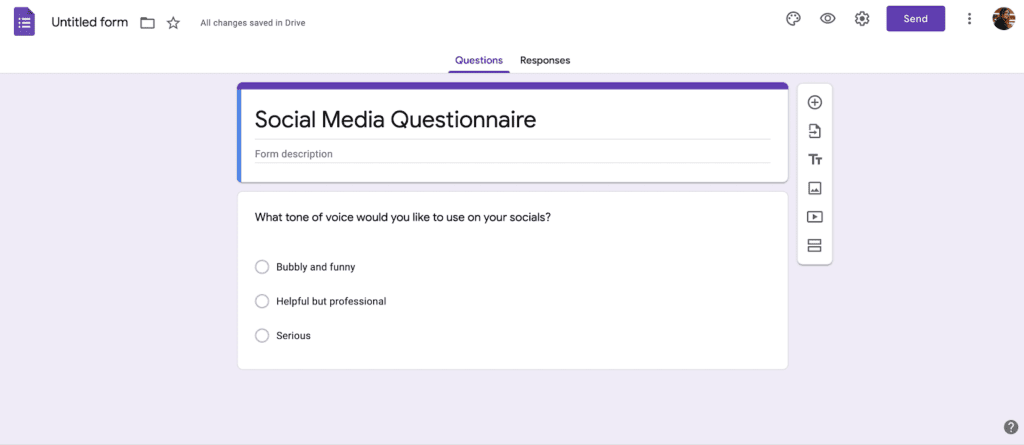
Google Forms are free to use if you have a Google account. The form designs are very simple and the tool is easy to use.
To create a Google form, head to your Google Drive and hit “New” and then “Google Form”.
From there, you can customize your questions, your theme, and add in more optional settings like a confirmation message.
Gravity Forms
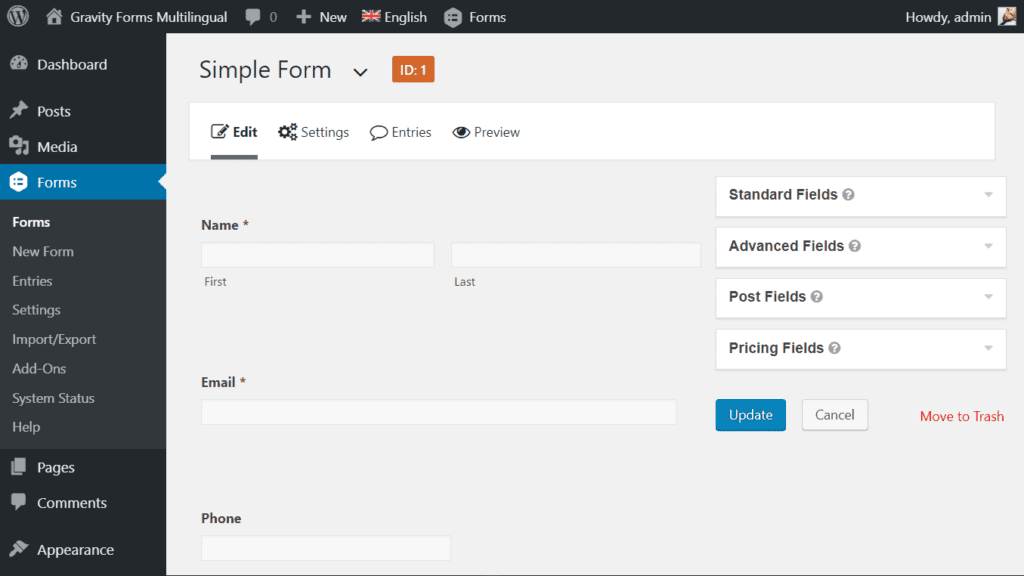
If you use a WordPress-powered website, Gravity Forms is an advanced tool for creating many different types of forms. It’s available at three different pricing plans.
You can get more out of Gravity Forms like file uploads as well as integrating with email and using add-ons for programs like Hubspot and Mailchimp.
Important consideration for using online forms
If you’re going to use online forms to build social media surveys, keep in mind that there are a couple of disadvantages.
Clients have to complete the form in one sitting
Once clients receive your questionnaire, they’ll have to submit their answers all in one go. They can’t come back to the questions at another time. So if they need to exit the form for any reason, they’ll have to re-do all their work again when they come back to it.
This inconvenience might delay how quickly you get back your answers.
You still need to use email to follow up
When you use online forms to create your questionnaires, you’ll still need to do the manual work of sharing it with a client over email, reminding them to complete it, and sending follow up emails if anything they’ve answered is unclear.
This can be a huge time suck that you don’t need in your life.
Bonus tips for creating social media survey questions
Last but not least, you should know some basic principles of writing questions to understand your client and their social media platforms. Here are four important details to remember:
- Ask easy-to-understand questions: Aim to make your questions concise and easy to understand. The goal is to gather actionable insights, so don’t make your client confused with unclear inquiries.
- Don't make it too long: You should respect your (potential) client’s time by keeping the questionnaire relatively short. Lengthy surveys can lead to respondent fatigue, causing drop-offs and inaccuracies.
- Avoid biased or leading questions: Such questions can subtly influence your client’s answers, leading to skewed data, so make sure to come up with questions that do not imply any particular answer or favor a specific perspective.
- Update the form over time: Social media is a dynamic and ever-evolving landscape, so it's essential to keep your survey questionnaire up-to-date.


